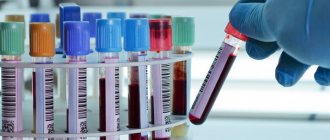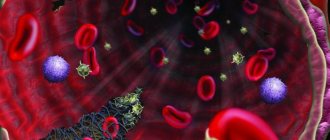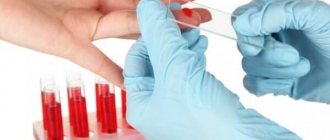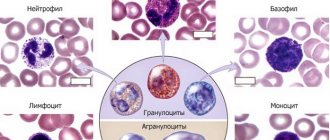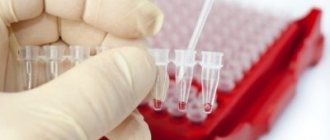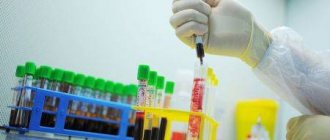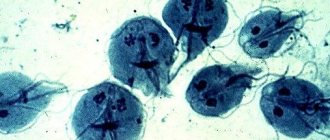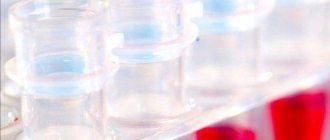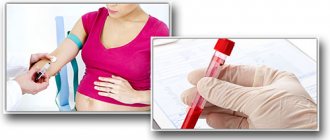In today’s article we will fully study and analyze the analysis for antibodies to hCG. Human chorionic gonadotropins (hCG) are specific placental hormones responsible for regulating and maintaining pregnancy. In this regard, human chorionic gonadotropins are also called specific pregnancy hormones.
Thanks to the effect of hCG on the body, there is an increased production of hormones that help maintain pregnancy and create the conditions necessary for bearing a fetus.
Also, hCG tests are highly sensitive ways to determine pregnancy in the early stages. An increase in the levels of human chorionic gonadotropins in the blood is observed from the sixth to fourteenth day from the moment of conception.
An increase in hCG in men can be observed in the presence of tumors in the testicles.
What functions does the hCG hormone perform?
This hormone plays an important role in the process of conception and pregnancy. HCG promotes:
- stimulating the processes of implantation of fertilized eggs (FE) into the uterine wall;
- prevention of OC rejection;
- stimulating the growth of VT (corpus luteum);
- the production of progesterones and estrogens necessary to maintain pregnancy;
- maintaining pregnancy (especially in the early stages);
- stimulation of testosterone synthesis in the testes of a male embryo (this process is extremely important for the full formation and development of male sexual characteristics).
What is hCG
HCG is a special hormone that is produced by the placenta during gestation. It is necessary for a successful pregnancy and performs the functions listed below:
- Stimulates the synthesis of progesterone and estrogen in the first weeks of gestation, and also prevents the disappearance of the corpus luteum.
- Prevents aggression of the mother's immune system against fetal tissues and cells.
- Takes part in changing the physiological state of a woman’s body.
- Stimulates the baby's adrenal glands and sex glands.
- Carries out the formation of sexual characteristics in a male child (triggers the mechanism of testosterone production by the fetal testicles).
HCG is important for the proper development of pregnancy. It stimulates all the processes provided by nature for the full bearing of a child. This hormone is produced by the cells of the fertilized egg (from which the placenta is then formed) and prevents the reverse development of the corpus luteum, triggers the mechanism of synthesis of progesterone and estrogen.
An hCG test can be taken as early as 9 days after the release of the egg from the ovary. It is during this period that the zygote invades the endometrium and pregnancy begins to develop. During normal pregnancy, the concentration of this hormone increases every two days, reaching maximum values of 50,000-10,000 IU/l at 8-10 weeks of gestation (counting from the date of the last menstruation).
Then the amount of hCG begins to fall rapidly and by the 18-20th week of pregnancy it is halved, after which it remains at the same level until childbirth. It is important for the expectant mother to monitor the levels of this hormone, since it is the most important guarantee of maintaining pregnancy.
Why can antibodies to hCG be formed?
Antibodies to hCG (Ab to hCG) can be formed as a result of specific disruptions in the functioning of the immune system of a pregnant woman. In this case, her immune system perceives the embryo and placenta as foreign agents and starts the process of actively synthesizing antibodies to her own cells.
The resulting antibodies to human chorionic gonadotropin can cause fetal development to slow down or lead to termination of pregnancy.
When do antibodies appear?
Medical scientists, engaged in research into the process of formation of hCG antibodies, are convinced that the main reason for their appearance is that human chorionic gonadotropin cannot be recognized as “native” to a woman’s body, being a chemical substance. Its production by the corpus luteum continues for 10–14 days during the first weeks of pregnancy. Later, this function is taken over by the placenta.
The production of human chorionic gonadotropin increases markedly, helping to maintain the normal course of pregnancy. Thanks to the presence of the hormone in the urine, a woman can do a test early on and make sure that conception has occurred. In most cases, antibodies are not produced and pregnancy proceeds without complications, but sometimes antibodies synthesized in the body completely block the production and functionality of hCG, which causes spontaneous miscarriage or premature birth.
The presence of antibodies to human chorionic gonadotropin in a woman’s blood leads to chronic miscarriage. There are several reasons for the appearance of antibodies to hCG:
- genetic factor;
- malfunction of the immune system;
- the presence of severe viral infections;
- administration of ready-made hCG preparations before in vitro fertilization.
In the latter case, the injected hormone is perceived by the woman’s body as a foreign body, and from the moment of its administration, the body begins to intensify the production of antibodies, which serve as the immune response of the defense system.
Why is the level of human chorionic gonadotropin tested?
Determining the level of human chorionic gonadotropin can be used for:
- performing early pregnancy diagnostics;
- monitoring of fetal development (monitoring of hormone compliance with the week of pregnancy is carried out);
- assessing the risk of spontaneous abortion (discrepancy between hormone levels and gestational age);
- complex diagnosis of ectopic pregnancies;
- conducting prenatal screenings for fetal pathologies;
- control of the development of relapses of trophoblastic tumors;
- diagnosis of neoplasms producing human chorionic gonadotropins;
- diagnosis of the causes of amenorrhea;
- assessing the completeness of induced abortions, etc.
In what cases is b-hCG analysis recommended?
First, let's look at the definition. Human hCG contains alpha and beta particles. The most important in its significance is the second part. It is, in fact, called free b-hCG. Laboratory testing is recommended:
- For the diagnosis of Down, Patau and Edwards syndromes in the fetus at the beginning of pregnancy.
- When the woman’s age at the beginning of the prenatal period is more than 35 years.
- If close relatives of the patient had congenital malformations.
- If one of the parents has previously been exposed to radiation or other types of radiation.
Norm of the hormone in the blood in honey per milliliter
In men, the hormone level should not exceed 2.5.
In non-pregnant women, hormone levels are normally less than five.
During pregnancy, the hCG level changes from week to week:
It should also be noted that when elevated hCG levels are first detected, pregnancy must be confirmed by ultrasound.
Treatment of abnormalities
Detection of antibodies to hCG - indication for treatment
To restore a normal blood picture and the possibility of pregnancy, treatment is carried out using a number of medications. It differs for pregnant and non-pregnant women. If there is no pregnancy, then the following drugs are used for therapy:
- drugs that relieve luteal insufficiency,
- immunomodulators,
- metabolic drugs.
The blood is also purified using a special device. A gynecological examination is mandatory and allows you to identify neoplasms, if any.
Pregnant women are prescribed glucocorticoids, drugs to prevent blood clots, and drugs that eliminate placental insufficiency. Specific medications and their dosage regimen are selected individually for each woman.
Causes of increased hCG in the blood
In men, an increased level of hCG may indicate the presence of seminoma, testicular teratoma, malignant lesions of the gastrointestinal tract (especially with colorectal cancer), kidneys, lungs, etc.
In non-pregnant patients, increased hormone levels may indicate the presence of:
- chorionic carcinoma;
- hydatidiform mole;
- oncological tumors in the intestines, lungs, uterus, kidneys, etc.
Also, hormone levels can be increased within 5 days after an abortion and during treatment with drugs containing human chorionic gonadotropins.
It should be noted that hCG is not a highly accurate tumor marker; therefore, it cannot be used as the main method for diagnosing tumors.
During pregnancy, the level of this hormone can be increased (above normal) if a woman has:
- several fetuses (multiple pregnancy);
- early toxicosis and gestosis;
- gestational diabetes.
Also, elevated levels of the hormone may indicate the presence of fetal pathologies (chromosomal aberrations), etc.
In some cases, an increase in hCG is observed while taking artificial gestagenic drugs.
Increasing the indicator
Antibodies to hCG increase during the formation of a pathological immune response. Its most likely causes are previous viral diseases and hereditary predisposition. An increase in the indicator reveals:
- Immunological infertility.
When examining patients with suspected infertility, an elevated AT level is considered in favor of immunological causes. - The likelihood of spontaneous abortion.
An autoimmune reaction can provoke miscarriage and intrauterine fetal death. Under the influence of AT, the level of hCG and related hormones (progesterone, estradiol), necessary for the process of bearing a child, changes. - Risk of fetal developmental abnormalities.
Anti-hCG indirectly affects the process of formation and development of the internal organs of the unborn child. The most likely complications are DIC syndrome and pathologies of the reproductive system in male fetuses, provoked by insufficient production of testosterone in the testes (its synthesis is stimulated by human chorionic gonadotropin). - hCG-producing tumors.
Some types of cancer tumors consist of germ cells that produce human chorionic gonadotropin. An increase in AT levels is possible with hydatidiform mole, chorionic carcinoma, testicular cancer, germ cell tumors of the uterus and ovaries. In rare cases, it is detected in cancer of the liver, kidneys, stomach, pancreas, large and small intestines, and lung.
Why do they test for free b-hCG?
This study can be carried out for the diagnosis of trophoblastic and testicular tumors, as well as in a complex of prenatal screenings for fetal chromosomal aberrations.
In healthy male patients, b-hCG levels should be below 0.1 ng per milliliter, and in non-pregnant women below two.
During pregnancy, normal values depend on the period:
An increase in b-hCG levels in men can be observed if they have testicular neoplasms.
In women, increased results are observed with choricarcinomas or the presence of Down syndrome in the fetus.
A decrease in levels in pregnant women may indicate the presence of Edwards syndrome in the fetus.
What are ELI-AFS-hCG tests?
According to indications, when planning pregnancy, infertility, or in early pregnancy, ELI-APS-hCG can be prescribed, which includes the determination of specific antibodies that appear in anti-hCG syndrome or antiphospholipid syndrome (an autoimmune disease accompanied by the development of hypercoagulation, thrombosis, termination of pregnancy, infertility or the development of such severe pregnancy complications as preeclampsia and eclampsia).
Also, if the presence of antiphospholipid syndrome is suspected, tests for antibodies to hCG may be prescribed in combination with:
- antibodies to cardiolipin;
- lupus anticoagulants;
- general antiphospholipid antibodies.
Read further: HCG for ectopic and frozen pregnancies in the early stages
- about the author
- Recent publications
Infectious disease doctor of the highest category with extensive experience. Specializes in the treatment of infectious diseases of various etiologies, methods of laboratory diagnosis of biomaterial. More details
Antibodies to hCG - what does the analysis show?
Analysis for antibodies to hCG as part of a triple test plays an important role in prenatal screening for fetal pathologies, as it allows early detection of chromosomal aberrations.
During the 1st trimester of pregnancy (the test is performed between the eighth and thirteenth weeks), the blood for the level of hCG (and, if indicated, antibodies to hCG) is assessed together with the PAPP-A test.
During the second trimester (from the fifteenth to the twentieth week), an analysis for hCG and antibodies to hCG is carried out in conjunction with an assessment of the level of free estriol and alpha-fetoprotein (AFP).
A blood test for antibodies to hCG also allows you to assess the risk of developing spontaneous abortion and clarify the reason for the development of habitual miscarriage, in cases where spontaneous abortions are associated with anti-hCG syndrome (anti-hCG syndrome is a specific autoimmune reaction of the body, manifested by the appearance of antibodies to hCG).
Antibodies to hCG appear as a result of immune disorders. Normally, these antibodies can be detected in minimal quantities, but when they increase above the threshold value, antibodies to hCG begin to:
- actively damage placental tissue;
- disrupt the development of the corpus luteum;
- slow down the normal embryo;
- promote the formation of PN (placental insufficiency);
- disrupt the full functioning of human chorionic gonadotropins;
- reduce the synthesis of hormones such as estriol and progesterone;
- increase the risk of developing DIC syndrome;
- lead to fading of pregnancy or development of miscarriages, etc.
However, despite the fact that antibodies to hCG can lead to spontaneous abortions, infertility, etc. their identification is not a death sentence. With timely treatment of elevated antibodies to hCG during pregnancy, it is often possible to prevent the development of spontaneous abortion.
The most effective method of reducing the level of antibodies to hCG is plasmapheresis.
Reasons for the development of an autoimmune response to hCG
Treatment allows you to normalize reproductive health
The production of antibodies to hCG is always an autoimmune phenomenon in which the body's defense cells are directed against healthy tissues and cells in the body. Thus, no matter what causes the change, it is classified as autoimmune. However, an increased amount of antibodies to hCG, unlike most autoimmune pathologies, can be corrected and eliminated.
How is the hCG antibody test performed?
Venous blood is used to test for antibodies to the hormone. The level of antibodies to hCG is determined using an enzyme-linked immunosorbent assay (ELISA).
Normally, when planning pregnancy, antibodies to hCG should be lower:
- 25 units/ml when determining IgG;
- 30 units/ml when determining IgM.
When interpreting test results, it is necessary to take into account that the reference limits of research in different laboratories may vary slightly (this depends on the sensitivity of the reagents used). In this regard, when interpreting the analysis, it is necessary to focus on the standards indicated on the laboratory form.
Preparing for analysis
The biomaterial for the test is venous blood. The delivery procedure must be carried out in the morning. Preparation consists of general rules:
- The break in eating should last 8-12 hours. If you feel worse, you can reduce the period of fasting to 4-6 hours. Drinking water without gas is allowed as usual.
- When ordering a test, you need to tell your doctor about the medications you are taking. Drugs that could affect the result will be discontinued or taken into account during interpretation.
- 24 hours before the procedure, it is necessary to avoid alcoholic beverages, heavy physical activity, and emotional stress.
- In the morning before submitting the biomaterial, it is prohibited to conduct instrumental examinations or physiotherapeutic treatment.
- You should not smoke 30 minutes before the procedure.
Hemorrhoids kill the patient in 79% of cases
Blood is collected by venipuncture. In the laboratory, it is centrifuged and clotting factors are removed from the plasma. The isolated serum is examined using the enzyme immunoassay method. Preparation of final data takes 1 day.
